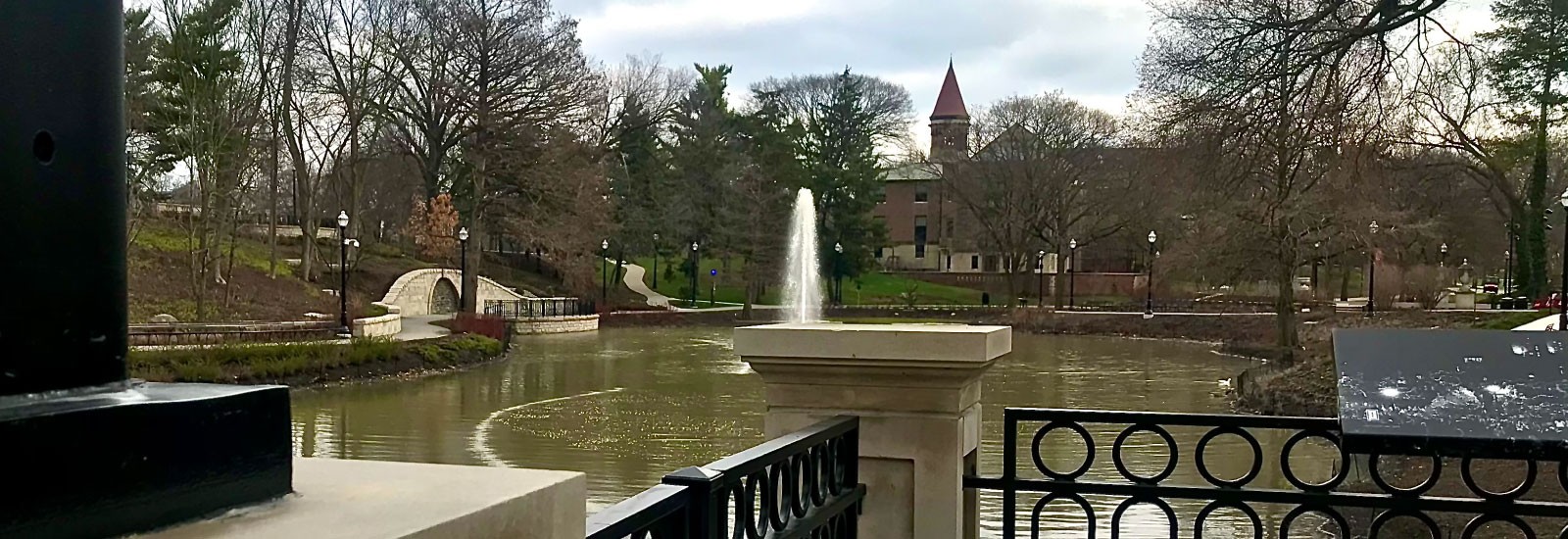It’s one of the most iconic and majestic places on Ohio State’s campus. Whether it’s studying, taking pictures or exercising, students, faculty, staff and visitors flock to Mirror Lake, but the lake is more than just a place for Buckeyes to gather. It’s playing a key role in advancing the university’s sustainability efforts.
In addition to adding 250-300 new plants around Mirror Lake in autumn 2020, Facilities Operations and Development (FOD) Landscape Services is using coffee grounds instead of artificial fertilizer in plant beds surrounding the lake.
As an FOD groundskeeper, Ed McGowan has been landscaping for 16 years, with sustainability as his passion.
“I want to improve the quality of our plants and our landscape, and natural products are fantastic,” McGowan said.
After FOD put the coffee grounds through a trial run, spreading them around a few sections of plants at a time, the crews saw improved conditions within three weeks.
“Spreading the grounds with shovels is the quickest, easiest and most effective way,” McGowan said, “But we will occasionally work them into the soil a little bit by using a mini-tiller to get them down into the roots and prevent them from being washed away.”
Landscapers partnered with FOD’s Energy Services and Sustainability (ESS) team to obtain the coffee grounds from various campus dining locations.
“Landscapers were looking for fresh coffee grounds, which are rich in nitrogen and acidity, to add to the soil,” said Molly Kathleen, ESS zero waste coordinator.
Student Life Dining Service’s Kathie Serif, associate director of operations, says her team is always looking for ways to reduce waste and increase sustainability, so joining the coffee grounds reclamation program was a good fit.
The process starts in campus cafes, where ESS workers set up composting bins to collect settlings from the Terra Byte Café, Berry Café, Crane Café, Curl Market and the Wexner Medical Center. As a result, anywhere between 200 to 1,200 pounds of coffee grounds weekly are diverted from the landfill and put to good use as fertilizer.
“Our program of using coffee grounds to enrich the soil instead of going to waste is one of the many ways we support the university’s vision for creating a more transparent and sustainable food system,” Serif said.
“It takes us full-circle from generating the materials and collecting them,” Kathleen said. “The coffee grounds start in the beverages made for students, faculty and staff and end by becoming a part of the soil in one of the highest profile places on campus.”
This isn’t the first time coffee grounds have been used as fertilizer at Ohio State. The Wexner Medical Center originally started using the material for fertilizer in 2018 through a project called Grounds for All, the first large-scale coffee grounds composting effort at the university.
“The original Grounds for All project provided a way to address a large contributor to the university’s landfill waste load,” said Mike Shelton, associate director of Ohio State’s Sustainability Institute. “Its successful expansion to address waste and sustainably to improve campus beautification efforts exemplifies Ohio State’s ongoing dedication to sustainability.”
The first phase of that project diverted more than 100,000 pounds of compostable coffee grounds from the landfill during the program’s first year.
Jim Warner, program director for Culinary Outreach at the Wexner Medical Center, says they anticipate a total collection of more than 200,000 pounds annually.
“At the onset of the program, we had a lot of enthusiasm from staff and cafes,” Warner said. “We hope to continue the project for many years to come.”
FOD’s efforts at Mirror Lake could expand soon, with more campus locations being considered starting spring 2021.
